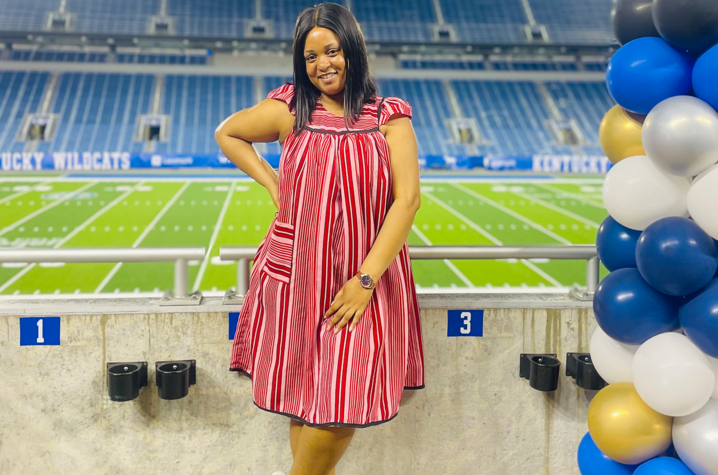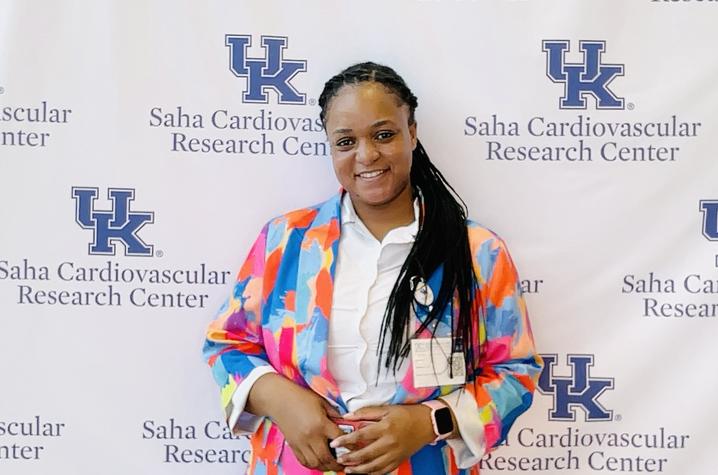‘I belong here, without a doubt’: Esther Ndashaala’s journey from Namibia to UK
LEXINGTON, Ky. (April 4, 2025) — The first bowl that Esther Ndashaala ever owned was given to her by her University of Kentucky mentor.
“And it came with food!” Ndashaala said.
A Fulbright scholar, Ndashaala moved from Namibia, located in Southern Africa, to Lexington to earn her master’s degree in nutrition and food systems from the UK Martin-Gatton College of Agriculture, Food and Environment (CAFE), which she completed in December 2024.
Her thesis adviser was Robin Shoemaker, formerly in the Department of Dietetics and Human Nutrition and now an assistant professor in the UK College of Medicine. Soon after they began collaborating, Shoemaker invited Ndashaala to her house to eat with her family.
“They made me feel at home,” Ndashaala said. “As much as I’m far from family, I didn’t really feel that void because of her.”
The hospitality was extra special because of Ndashaala’s area of study and commitment to increasing access to nutritious food.
Nutrition is ‘really close to my heart’
Ndashaala is from Okapya, Ogongo, in the northern part of Namibia. The small village depended on rain to be able to grow maize and mahangu, a rain-fed cereal grain that is a staple in Namibia. Sometimes, the village went too long without rain.
Ndashaala and her family were “fortunate” and had enough money to eat at least one meal a day, but others in the village had less.
When Ndashaala was 7 years old, her friend died from malnutrition.
“That was the hardest thing ever for me,” she said. “I didn’t understand death.”
Traumatized, Ndashaala repeatedly asked her grandmother what happened. Finally, she understood: It was because of the food.
The area was very food insecure, as are other parts of Africa with much land but little productivity. Ndashaala learned that people in her village were suffering because of poor food choices that led to lifestyle-modified diseases, like diabetes and high blood pressure.
“Nutrition, for me, I needed to do it,” she said. “I needed someone in my family back when I was a child to have done nutrition for us to have led a better life. So I felt like I’m the change that I needed when I was younger.”
At the University of Namibia, Ndashaala earned her undergraduate degree in food science and technology. Studying nutrition has enabled her to help the people she loves, including her 94-year-old grandfather. Thanks to that guidance, her grandfather has not developed high blood pressure.
Nutrition is “really close to my heart,” Ndashaala said. “I’m really happy that I’m able to now advise.”
‘My heart fell in love with Lexington’
After Ndashaala received the Fulbright scholarship, she could choose where in the United States she wanted to study.
“I went to do my research, and my heart fell in love with Lexington,” Ndashaala said.
She was drawn to Lexington because it’s a city that isn’t overcrowded and is surrounded by nature, and she saw through her research that UK is a strong academic institution.
“You know what, I think I belong here, without a doubt,” Ndashaala thought as she made her decision.
The first time Ndashaala used the bus system after moving to Lexington in August 2023, she accidentally got on a bus that took her off campus.
“It looked so beautiful because there were farms,” she said. “So I just kept looking out the window until the driver asked me, ‘Ma’am, where are you going?’ That’s when I realized I was on the wrong bus. But I loved it.”
Ndashaala says people at UK made her feel welcome and helped her succeed in her program, including Shoemaker, DHN Director of Graduate Studies Dawn Brewer, and Dolph Davis, another student in Shoemaker’s lab whom Ndashaala called her “brother on campus.”
Shoemaker said her lab is focused on identifying blood biomarkers that can aid in the detection of pre-eclampsia, “a dangerous and unpredictable” condition of high blood pressure during pregnancy. Ndashaala’s thesis examined socioeconomic factors associated with pre-eclampsia.
“There is an urgent need to improve the understanding of the multiple socioeconomic and biochemical factors that can contribute to the development of pre-eclampsia in order to advance health care for this disease,” Shoemaker said. “Esther’s thesis plays an important role.”
In addition to her thesis, Ndashaala learned valuable information and skills from courses about advanced community development, the relationship between obesity and food insecurity, and more.
“Am I satisfied with the knowledge I’ve acquired now? More than 110%,” Ndashaala said.
She wants to continue her education at UK, earning her doctorate in nutrition or public health. Her goal is to help communities understand why and how they should improve nutrition “to make it a better space for all of them.”
“What I hope for next is more education,” Ndashaala said. “I want to grasp as much as I can.”
‘The best day of my life’
Ever since she learned she was a Fulbright scholar, Ndashaala said her days had been getting better and better — culminating in her graduation day, which she called “the best day of my life.”
On Dec. 20, 2024, Ndashaala represented the UK class of 2024 as the commencement ceremony student speaker.
“Looking back on this path we’ve taken, it’s evident that our time at the University of Kentucky has been about more than just classes and exams,” Ndashaala said in her speech. “It’s been about becoming who we are meant to be and making the world a better place with the knowledge that we gained.”
Ndashaala said she hoped she was speaking to “my mirror — a person who fought to get here, a person who went down through deep waters to get here, a person who deserves to be here.” She said she hoped her speech was a motivation for her fellow graduates.
“As we celebrate today, let us remember that while this chapter closes, our responsibility to the world is just beginning,” Ndashaala said. “So let’s go out there and make a difference, let’s create, let’s inspire, and let’s leave our mark in ways that make this world healthier, kinder and better for all.”
As the state’s flagship, land-grant institution, the University of Kentucky exists to advance the Commonwealth. We do that by preparing the next generation of leaders — placing students at the heart of everything we do — and transforming the lives of Kentuckians through education, research and creative work, service and health care. We pride ourselves on being a catalyst for breakthroughs and a force for healing, a place where ingenuity unfolds. It's all made possible by our people — visionaries, disruptors and pioneers — who make up 200 academic programs, a $476.5 million research and development enterprise and a world-class medical center, all on one campus.






